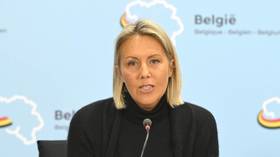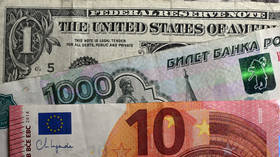EU state to give Ukraine $666 million of Russia’s money – media

Belgium is reportedly set to become the first EU nation to use Russia’s money to provide assistance to Ukraine. Brussels plans to spend the interest earned on frozen Russian assets on military aid for Kiev worth $666 million, Belga News Agency reported on Tuesday, citing the Belgian defense minister’s office.
Defense Minister Ludivine Dedonder had a phone call with her Ukrainian counterpart, Rustem Umerov, on Monday. “Belgium will provide €611 million ($666 million) in military aid this year and has a long-term commitment to supporting the modernization of our defense forces,” Umerov said on X (formerly Twitter) following the conversation. Dedonder reposted the message.
The Belgian minister’s office then confirmed to Belga on Tuesday that the phone call had taken place, adding that the money for the promised aid would come from interest generated by frozen Russian assets stored in Belgium. The defense ministry did not issue any separate statement on the issue.
A total of $300 billion worth of Russian forex reserves have been frozen by G7 countries, the EU, and Australia since the start of the conflict between Moscow and Kiev in February 2022. Most of those reserves ($232 billion) are reportedly held in the EU, with $208 billion located in Belgium.
According to Belga, the vast majority of frozen Russian reserves are held by the Belgium-based Euroclear financial company, which continues to make “record profits.”
The US and its allies in Europe and elsewhere have so far been reluctant to consider confiscating frozen Russian assets, despite otherwise slapping Russia with unprecedented sanctions over its ongoing military campaign. Russia’s RIA Novosti news agency reported this week that the West could stand to lose almost just as much money as it would seize from Russia if it proceeds with its confiscation plan.
Calls for the seizure of assets have grown louder in recent months, according to the media. In December, the Financial Times reported that Washington had proposed that working groups from the G7 explore ways to confiscate the $300 billion in frozen Russian assets on February 24, 2024. Bloomberg also reported that the idea had received support from the White House.
On Tuesday, Reuters reported that EU member states had so far failed to reach an agreement on the risky move, and such a possibility remained “unlikely.” Last month, Brussels proposed seizing interest generated by the frozen Russian funds instead while leaving the principal intact.













